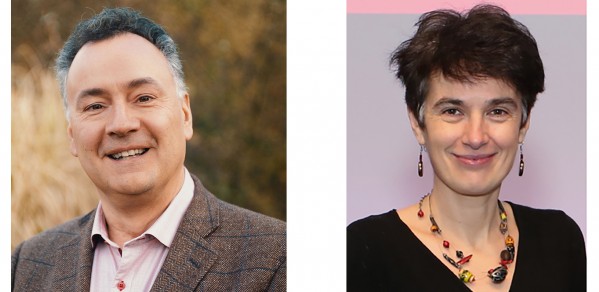
Professor George Malliaras and Professor Mihaela van der Schaar have been elected as Fellows of the Royal Society, the UK’s national academy of sciences and the oldest science academy in continuous existence.
The Royal Society is a self-governing Fellowship of many of the world’s most distinguished scientists drawn from all areas of science, engineering and medicine.
The Society’s fundamental purpose, as it has been since its foundation in 1660, is to recognise, promote and support excellence in science and to encourage the development and use of science for the benefit of humanity.
This year, over 90 researchers, innovators and communicators from around the world have been elected as Fellows of the Royal Society for their substantial contribution to the advancement of science. Ten of these are from the University of Cambridge.
Sir Adrian Smith, President of the Royal Society said: “I am pleased to welcome such an outstanding group into the Fellowship of the Royal Society.
“This new cohort have already made significant contributions to our understanding of the world around us and continue to push the boundaries of possibility in academic research and industry.
“From visualising the sharp rise in global temperatures since the industrial revolution to leading the response to the Covid-19 pandemic, their diverse range of expertise is furthering human understanding and helping to address some of our greatest challenges. It is an honour to have them join the Fellowship.”
The Fellows and Foreign Members join the ranks of Stephen Hawking, Isaac Newton, Charles Darwin, Albert Einstein, Lise Meitner, Subrahmanyan Chandrasekhar and Dorothy Hodgkin.
Professor George Malliaras FRS
Malliaras is the Prince Philip Professor of Technology in the Department of Engineering, where he leads a world-leading research group The Bioelectronic Lab that works on the development and translation of implantable and wearable devices that interface with electrically active tissues, with applications in neurological disorders and brain cancer.
Research conducted by Malliaras has received awards from the European Academy of Sciences, the New York Academy of Sciences, and the US National Science Foundation among others. He is a Fellow the Materials Research Society, Academia Europaea and the European Academy of Sciences, and an honorary doctor of the University of Linköping.
Speaking about the fellowship he says: “I am deeply honoured! Credit belongs to my students and collaborators who are a constant source of inspiration to me.”
Professor Mihaela van der Schaar FRS
Van der Schaar is the John Humphrey Plummer Professor of Machine Learning, Artificial Intelligence and Medicine in the Departments of Applied Mathematics and Theoretical Physics, Engineering and Medicine. She leads a world-leading research group The Van Der Schaar Lab which develops cutting-edge machine learning and AI technologies which have numerous applications, including medicine and healthcare.
She is the founder and director of the Cambridge Centre for AI in Medicine, and a Fellow at The Alan Turing Institute. Her work has received numerous awards, including the Oon Prize on Preventative Medicine, a National Science Foundation CAREER Award, and the IEEE Darlington Award.
Van der Schaar is credited as inventor on 35 US patents, and has made over 45 contributions to international standards for which she received three ISO Awards. In 2019, a Nesta report declared her the most-cited female AI researcher in the UK.
Speaking about the fellowship she says: "I am delighted to be elected as a Fellow of the Royal Society! This honour should be shared with my family and students past and present and is only possible because of the support over the years of UCLA, Oxford, and Cambridge. I am grateful for this recognition and eager to continue creating Reality-Centric AI."

